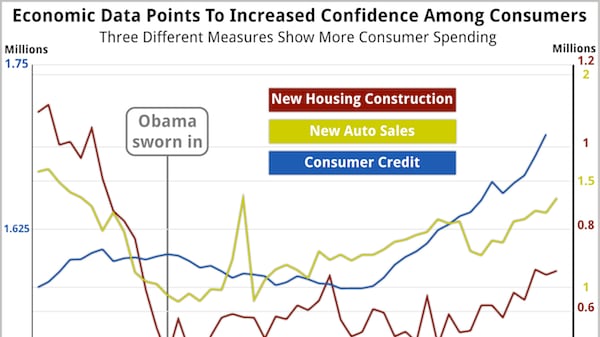The economy is improving. Talking Points Memo presents two charts that depict the improvement vividly:


These trends put paid, I think, to last year's Republican message, "Obama made things worse." Maybe Obama did, and maybe Obama didn't. But the worst seems definitively behind us, recovery is quickening, and this election—like most elections—will be about the future.
President Obama has stated his vision of that future. It is a future in which the emergency government activism of the first term hardens into a more permanent fact.
Here's the president in Osawatomie, Kansas, in November 2011:
Yes, business, and not government, will always be the primary generator of good jobs with incomes that lift people into the middle class and keep them there. But as a nation, we've always come together, through our government, to help create the conditions where both workers and businesses can succeed.
...
Of course, those productive investments cost money.
...
In the long term, we have to rethink our tax system more fundamentally. We have to ask ourselves: Do we want to make the investments we need in things like education and research and high-tech manufacturing – all those things that helped make us an economic superpower?
To some degree, that Kansas speech was intended as a clever framing of the November 2012 ballot question: investments that might benefit the middle class vs low tax rates that primarily benefit the rich.
Yet the speech was more than just an electoral gambit. It also revealed some core presidential convictions and suggested the main priorities of a second Obama term:
* Allow the Bush tax cuts to lapse;
* More government spending in hope of stimulating well-paid jobs either directly in the public sector or in private-sector firms that will depend on government contracts;
* Move to budget balance primarily through higher taxes, but also through some unspecified reforms in Medicare.
It's a coherent program. That is not to say it will succeed. I myself fear it sets the US onto the path that Britain tread in the 1990s, where Prime Ministers Blair and Brown defaulted to a policy of taxing London and southeast Britain in order to put the rest of the country on the public payroll: between 1997 and 2007, half of the net new jobs created through the north and west of Britain were created on the public payroll.
Whatever the Obama program's faults, however, it is a positive program. A Republican program that emphasizes "repeal" and "undo" is not a positive program. It's not a future-oriented program either: it's a program to refight the battles of the past four years, hoping this time to win the fights that were lost last time.
The gap will especially glare in the area of healthcare. If President Obama is re-elected, near-universal coverage will become a fact—a cludgy and expensive fact, but a fact. If President Obama is defeated, the promise of universal coverage will be withdrawn, to be replaced by ... what? The country is still waiting for that answer.
An opposition party challenging a president who can claim a record of economic recovery cannot afford to leave the country waiting. Anti-Obamaism won't suffice in 2012. So what is the answer to the person who worries: "A vote against Obama is a vote to give back my health care coverage. What will your team offer instead?"






